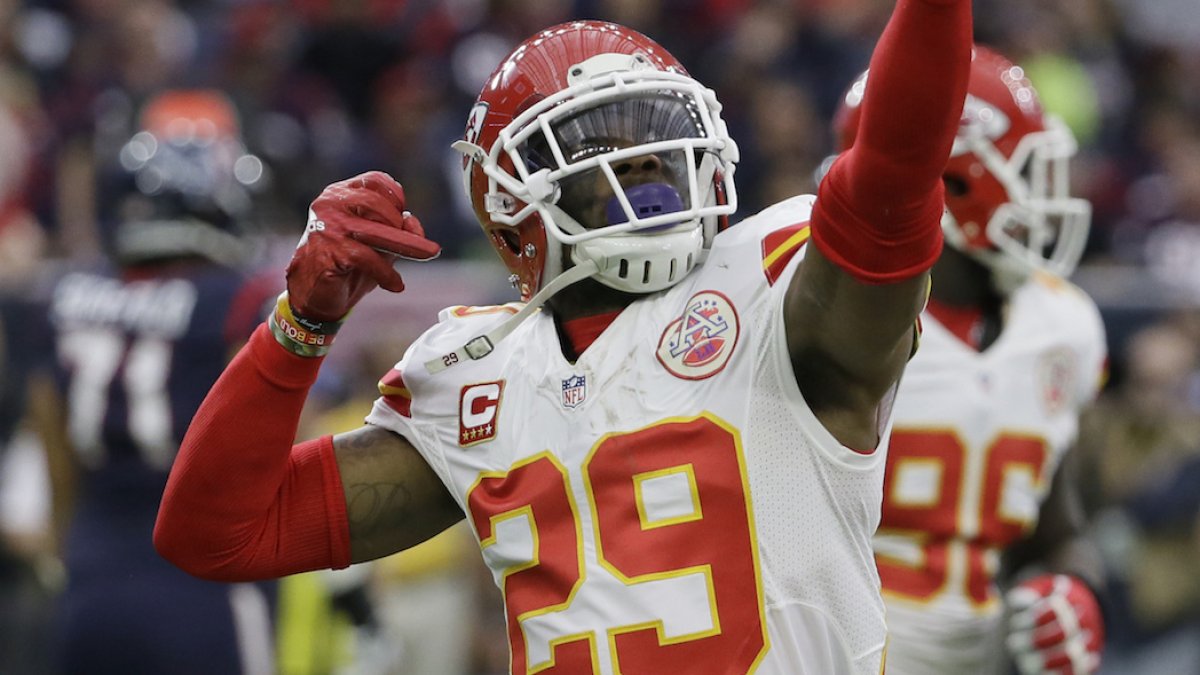On Monday, the Minnesota Vikings made the move that many have called for by signing safety Harrison Smith (92.8 overall grade in 2015) to a contract extension worth $15.2 million fully guaranteed and $10.25 million per year. Smith became the NFL’s best safety last season for the upstart Vikings' defense, and by surpassing Earl Thomas’ $10 million per year, he also became the highest-paid safety on a per-year basis.
The Kansas City Chiefs also have a solid defense, earning the sixth-highest team grade in that regard last season. A keystone of the Chiefs' defense in 2015 was sixth-year safety Eric Berry, who is currently set to play on a one-year, $10.81 million deal under the franchise tag. Berry has made the Pro Bowl in all four of his full seasons, emerging substantially since Andy Reid and Bob Sutton took over in 2013, finishing second and fourth in total cumulative grade among all NFL safeties in 2013 and 2015, respectively. Last season, he helped the Chiefs stave off injuries to key contributors Phillip Gaines and Husain Abdullah, as well as a suspension to starting cornerback Sean Smith, to finish fourth in the NFL in total pass-coverage grade. With Harrison Smith seemingly setting the market Monday with his new deal, the Chiefs have a nuanced situation regarding their long-term relationship with Berry.
Current state of the Chiefs’ secondary
As previously mentioned, the Chiefs have been able to overcome deficiencies in the secondary in the past. However, losing Sean Smith, Abdullah, and Tyvon Branch from a defense that played in dime personnel more than any other team in the NFL last season will present a challenge. While Gaines appears set to return from injury to help at corner, the Chiefs did nothing in the offseason to shore up safety depth, leaving special teams captain Daniel Sorensen, Stevie Brown, and converted cornerback Jamell Fleming to back up Berry and Ron Parker, as well as help out in sub-packages. When pressed to play last season, Sorensen posted three negatively-graded games, with his five missed tackles leading to the second-worst tackling efficiency (3.6) among qualifying safeties in the passing game. Brown hasn’t played in an NFL game since 2014, while Fleming gave up a 96.1 passer rating into his coverage during limited duty last season, which included surrendering the game-tying touchdown pass against Denver in Week 2.
A long-term deal with Berry answers at least one question for a Chiefs' team looking to rebuild their ever-changing secondary for years to come.
Berry’s health
Berry’s recovery from cancer last season—likely one of the best comeback stories in league history—has to be in consideration when gauging his long-term value with the Chiefs. Was last season’s success just the start, setting a lower bound for a string of seasons of elite-level safety play? How does Berry’s previous injury history (a torn ACL in 2011 and high ankle injury in 2014) complicate answers to the aforementioned questions? The Chiefs might be better served to sign two solid safeties at more team-friendly deals than leave themselves exposed if Berry were to miss time again.
The market
If the Chiefs were to move on from Berry in the 2017 offseason, there wouldn't be many options available near his caliber on the free-agent market. Former Chief Kurt Coleman, who had nine interceptions in 2015, is set to hit the market that year, as is Denver’s Darian Stewart, who provided the Broncos with great value as a free-agent signing in 2015. Both of these players are roughly Berry’s age, and would certainly not command the type of salary Berry would on the open market, but there is far less of a track record of high-level play for both of these players. If the Chiefs waited until 2018 to move on from Berry, Morgan Burnett and Ha Ha Clinton Dix of the Packers are set to become free agents, as are Miami’s Reshad Jones and Denver’s T. J. Ward. However, it’s more likely a player like Jones, whose run defense grade was the best among safeties last year, will be resigned by his current team before hitting the open market.
The relative lack of outside replacements notwithstanding, the Chiefs also have to consider the upcoming free agency of nose tackle Dontari Poe, who has been a standout for much of his career in Kansas City, finishing 15th, fifth, fourth, and sixth in stops among defensive tackles during his four NFL seasons. The Chiefs have already invested heavily on the defensive line, re-signing Allen Bailey and Jaye Howard within the last two seasons, and using their top pick on Chris Jones out of Mississippi State in the 2016 draft, however, so it’s more likely they would prefer Berry to Poe if resources became scarce.
Berry has been a tremendous player and an inspirational story for the Chiefs. While his situation is relatively unique, it’s likely that Kansas City would have signed him to a long-term deal already this offseason, had they not dealt with a substantial number of other key players hitting free agency, as well. Harrison Smith’s new deal with the Vikings sets something of a bar, not so much for the per-year salary (Berry’s 2010 rookie deal was for $10 million a year), but for the length of any deal. A long-term commitment to Berry has its risks, but failing to retain a cornerstone of what has become a high-level defense has risk that is substantially higher, given how much Kansas City lost in the secondary just this offseason.


 © 2025 PFF - all rights reserved.
© 2025 PFF - all rights reserved.